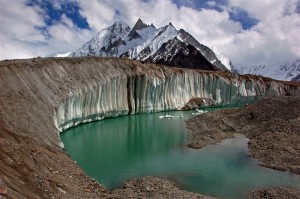Abu Dhabi Dialogue Group to discuss impact of fast melting Himalayan Glaciers early next month
Thursday, December 29th, 2011 2:42:12 by Naveed A Bari
Abu Dhabi Dialogue Group to discuss impact of fast melting Himalayan Glaciers early next month
Abu Dhabi Dialogue Group, a consortium of seven Himalayan countries, is set to meet early next year, to discuss the impact of fast receding Himalayan glaciers on the population of the concerned countries. The group comprising Pakistan, Afghanistan, Bangladesh,
Bhutan, China, India and Nepal was set up in 2006 in Abu Dhabi with United Kingdom, Australia and Norway joining in at later stages to help the countries with the expensive research work and in order to strengthen the dialogue process.
The seven Himalayan countries, which are more often at loggerheads with each other, have decided to share the knowledge and data amongst themselves, without trying to attempt to reach mutual consensus over the issues regarding the ownership of the rivers
and the waters within.
Some 1.5 billion people living in these countries are directly related to the subsistence agricultural farming, which increases the importance of the flowing waters which find their origins in the melting glaciers of the Himalayas.
Lack of coordinated effort to monitor the rate of recession of the glaciers and their impact on the environment and lives of the 1/3rd population in the world, has severely hindered any substantial work. India and Pakistan in particular and Nepal
and Bangladesh in general, have been fighting over the ownership issues of the waters including the Ganges and the Indus, have also effected any mutual agreement which would lead to curtailment of greenhouse gases- major source of climatic change and increased
atmospheric temperatures.
The biggest concern, the official said, was that there was little certainty over predictions and no consensus over observed changed. the rate of melting of the glaciers, which are the largest after the polar regions, have increased two-fold in the past decade,
threatening the coastal regions and the river deltas along the shores. Glacial melt will not only increase the sea levels in the adjoining areas but many of the smaller islands including Mauritius, is predicted to be completely submerged within a span of 50
years.
“The lack of data is so serious that there is a blank spot, meaning no data at all, in reports of the intergovernmental panel on climate change about glacier melting in the Himalayan region.” said a representative of the group.
The group is supported by the World Bank as well as the International Centre for Integrated Mountain Development which has convened more than 50 leading knowledge institutions across the region to be part of the process. At a previous session, stakeholders
from the countries held discussions on preliminary design of the Ganges Strategic Basin Assessment and examples of state-of-the-art regional hydrometeorological technology.
On the advice of the World Bank, the participating countries have agreed to have a regional hydro-meteorological system to overcome shortage of reliable data and its sharing mechanism. The World Bank will provide financial support in this regard.
Tags: Gilgit Baltistan, International Mountain Day, Islamabad, PTDCShort URL: https://www.newspakistan.pk/?p=7644

















